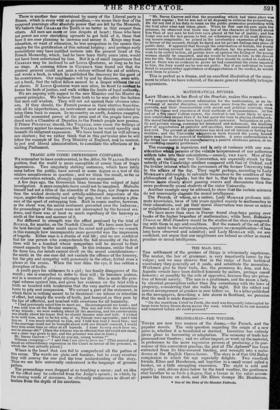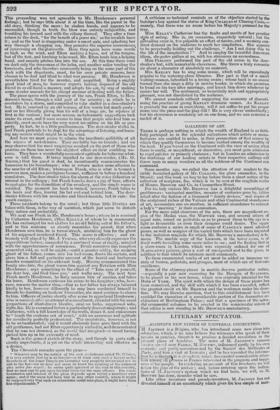MELODRAMAS—THE WITNESS.
THERE are now two sources of the drama,—the French, and the popular novels. The only question regarding the origin of a new piece is, whether it is translated or derived. Invention has entirely given place to borrowing or adaptation. The economy of trade has possessed our theatres ; and we either import, or work up the material, in preference to the more expensive process of producing., In pur- suance of this convenient practice, the plot of The Aylrners* has been extracted from its blue-covered binding, and wrought into a melo- drama at the English Opera-house. The-story is of that Old Bailey complexion in which the age especially delights. Two excellent friends, Elton and Henderson, sail together in a small vessel called a hooker, on a little smuggling excursion. The night is cold and squally; and, driven down below by the hard weather, the gentlemen chat together to so Irish a degree, that a breeze in the cabin accom- panies the breeze on deck, and Mr. Elton thumps Mr. Henderson.
• One of the Tales of the Manlier Festivals. This proceeding was not agreeable to Mr. Henderson's personal feelings ; but he says little about it at the time, like the parrot in the
old story, thinking the more ; he shakes hands, and appears to be
reconciled, though in truth the blow was entirely indigestible, and troubling his inward soul.with the villany thereof. They after a time
return to the deck, " for the benefit of a purer air," as the invalids have it ; and as the boat is staggering under a smart gale, and splashing her way through a chopping sea, they perceive the superior convenience; of conversing on the %forecastle. Here they again have some words as high as the wind, and Elton making a lapse, not of the tongue, but of the foot, and lurching to leeward, Mr. Elton lends him a helping hand, and cannily pitches him into the sea. At this time there were on deck only the steersman at the helm, and another sailor tending the foresheets, and who therefore necessarily being on the same part of the deck with the disputants, must, for his own private reasons, have chosen to be deaf and blind to what was passing. Mr. Henderson is nevertheless tried for the murder, and acquitted. Being a mighty good kind of man, he however regrets having disposed of his old friend in so off-hand a manner, and adopts his son, by way of making some slender amends for his abrupt manner of dealing with the father. The piece opens with the journey of the son, Frank Elton, to Hen- derson's house, through a wild part of the country ; in which he is overtaken by a storm, and compelled to take shelter in a deer-stealer's hut. He is received by an old woman, of few words but much pasty ; and on her liberally giving him his will of a huge pie, he rejoices at first in the venison ; but more serious melodramatic suggestions lurk under its crust, and it soon occurs to him that people who feed him so daintily, must needs have the very worst intentions on his life or pro- perty. In fact, he is a little pusillanimous. The deer-stealer stalks in, and Frank pretends to be deaf, for the advantage of listening, and learn- ing any secrets which might be in the wind.
And here we must pause to admire the inordinate gullibility of all the rogues of melodramas. Their credulity has no bounds ; and we may observe that the most suspicious conduct on the part of those who practise on them has never the slightest effect on their confiding 'na- tures. They have a wonderfully convenient aptitude for believing what- ever is told them. It being signified to our deer-stealer, (Mr. 0. SMITH,) that his guest is deaf, he incontinently communicates his knaveries to his housekeeper ; who in return makes some allusion to the murder of old Elton ; whereupon Frank, who is what is termed a nervous man, makes a prodigious bounce, sufficient to betray a hundred simulators. The deer-stealer takes the alarm at the noisy indication of interest in the colloquy; but Frank knocks down a jug of beer, affects to apologize for the demolition of the crockery, and the simple rogue is satisfied. The moment his back is turned, however, Frank takes to his heels and flies, leaving his hat and coat behind him. The deer- stealer follows with his associates and blood-hounds, but in vain : the youth escapes.
These incidents belong to the novel ; but those little liberties are taken with them, in the way of variation, which just serve to disturb their nature and probability.
We next see Frank in Mr. Henderson's house ; where he is received by Catherine Henderson, (Miss KELLY,) of whom he is enamoured.
Ile has exchanged his wet clothes for an old fishing suit of his father's, and in this costume so closely resembles his parent, that when Henderson sees him, he is terror-struck, mistaking him for the ghost of his supposed murdered•friend. This scene is effective ; and ex-
tremely well played by Mr. J. VINING, who very cleverly expresses the superstitious horror, succeeded by a confused sense of reality, mingled
with the apprehensions of conscience. Frank considers this reception somewhat odd, as well he might,—until a greater oddity, the seeming ghost of his father, comes into his bed-room, draws his curtain, and gives him a full and particular account of the horrid and barbarous
murder committed on his cidevant body. Having communicated this family anecdote, the ghost warns him against any flirtation with Miss Henderson ; says something to the effect of " Take care of yourself,
my dear boy, and God bless you," and walks away. The next time Frank meets Henderson, he flatly accuses him of murder, and takes his leave. Henderson confesses his crime to his daughter ; who, how- ever, reasons the matter thus,—that as her father has always behaved kindly to her, however differently lie may have conducted himself to friends lee-lurching on hookers' forecastles, she must continue to cleave to him. Officers of justice shortly after come to apprehend Henderson ; who is secured, after an attempt at concealment, attended with the usual proportions of short-drawn breaths, anxious looks, suppressed sobs, sighs, &c. He is examined before a particularly discreet magistrate ; . and Catherine, with a full knowledge of the truth, denies it, and endeavours to " laugh the evidence out of court," with an assurance and aptitude for mendacity perfectly professional. The magistrate, however, is not to he so bamboozled; and it would obviously have gone hard with the old gentleman, had not Elton opportunely walked in, and demonstrated that he was not drowned, as the world had imagined—a vessel having picked him up in his extremity of need.
Such is the general sketch of the story, and though in parts suffi- ciently improbable, it is yet on the whole interesting and effective as a drama.
The Chronicle remarks upon the piece- " Whoever may be the author of the new melodrama called The Witness, it is very certain that he is no lawyer—or at least only such a lawyer as the
Benchers of the Inner Temple are hereafter very properly determined not to
call to the bar—for he does not seem to know the meaning of the common plea autre fois acquit ; he seems quite ignorant of the rule in this country, that no man can be put upon his trial twice for the same offence. The whole - foundation and interest of the piece depends upon trying a murderer over , again ; and if the scene had been laid in any other country, where it might be supposed only that such an occurrence could take place, it might have been less objectionable.* A criticism so technical reminds us of the objection started by the butcher's boy against the statue of King CHARLES at Charing Cross,-.... namely, that there was no room before his Majesty's pummel for the tray. Miss KELLY'S Catherine has the faults and merits of her peculiar style of acting. She is, on occasions, exquisitely natural ; but the prevailing error is, too palpable an effort at nature, and a seeming con- stant demand on the audience to mark her simplicities. She appears to be perpetually holding out the challenge, " Am I not doing this to the life of the imagination ?" And to employ the beautiful American idiom, she pokes pathos at us, with too strenuous an earnestness. Miss PINCOTT performed the part of the old crone in the deer- stealer's hut, with remarkable cleverness. She threw a truly romantic air about a character of absolutely no material. Mrs. KEELEY has to sing some music, which will be exceedingly popular in the watering-place libraries. Her part is that of a smart waiting-woman, betrothed to a loving swain ; whose back is no sooner turned than she sings a ditty in nowise tender, in which she promises to tread on his toes after marriage, and knock him down whenever he resists her will. The sentiment, so beautifully arch and appropriately pleasant, was not disrelished by the audience. We cannot conclude without suggesting the economy of disconti- nuing the practice of giving KEELEY dramatic names. As KEELEY is precisely the same in everything, will it not suffice to put his proper name into the piece and the play-bill ? He is very clever undoubtedly ; but his cleverness is resolutely set on one form, and we can conceive a surfeit of it.



















 Previous page
Previous page